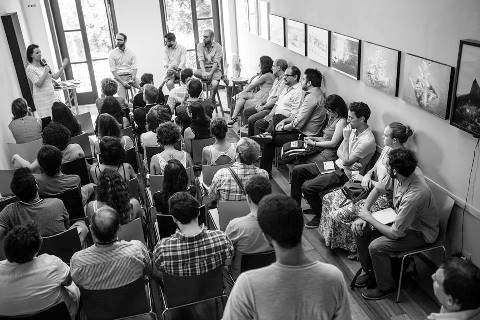
 Rio de Janeiro, Brazil was the venue chosen by the American Planning Association (APA) to celebrate the successful closure of its ECPA Sustainable and Inclusive Housing and Community Development project. On March 12, APA and its four partner organizations gathered to share best practices, lessons learned and challenges moving forward. The event was held at Studio X, an international urban planning network led by Columbia University’s Graduate School of Architecture, Planning and Preservation. Presentations of four projects in Bolivia, Brazil, Mexico and Peru highlighted community development, environmental concerns and sustainable practices, followed by a discussion about planning and design innovations to address urban growth whilst remaining sensitive to the needs of local communities.
Rio de Janeiro, Brazil was the venue chosen by the American Planning Association (APA) to celebrate the successful closure of its ECPA Sustainable and Inclusive Housing and Community Development project. On March 12, APA and its four partner organizations gathered to share best practices, lessons learned and challenges moving forward. The event was held at Studio X, an international urban planning network led by Columbia University’s Graduate School of Architecture, Planning and Preservation. Presentations of four projects in Bolivia, Brazil, Mexico and Peru highlighted community development, environmental concerns and sustainable practices, followed by a discussion about planning and design innovations to address urban growth whilst remaining sensitive to the needs of local communities.
In 2010 APA received its first grant from the U.S. Department of State’s ECPA program to promote dialogue and capacity building focused on urban planning and sustainable development practices across Latin America and the Caribbean. Through this ECPA grant, in 2011 APA successfully collaborated with communities and local governments in the Americas to integrate smart planning practices into urban planning. The lessons discussed during this event focused on the importance of community engagement in all phases of urban development projects. All project representatives highlighted the importance of conducting short consultations with local stakeholders to help planners save time and money. Although projects resort to the technical expertise of planners and architects, experience has shown that a successful community initiative depends to a great extent on the local knowledge and inclusion of residents.
In 2012, APA received a second grant from the ECPA to work with four nongovernmental organizations to integrate urban and regional planning processes and improve quality of life. This phase of the ECPA Urban Planning Initiative provided technical assistance to four demonstration projects fostering innovative solutions to housing and community development challenges. APA worked closely with communities in Brazil, Bolivia, Mexico and Peru and brought technical experts from the United States and Latin America with skill sets in various fields, including urban planning, real estate and policy, to work directly with these communities.
The Bolivian project Hábitat Para La Mujer Comunidad María Auxiliadora supported a cooperative of single mothers and victims of domestic abuse to be recognized as legitimate owner of the land where its housing project is settled. In Brazil, APA worked with the NGO Soluções Urbanas (Urban Solutions) on the Family Architect project, providing technical assistance and access to microfinance for families who live on less than three minimum salaries and need to restore their homes. In Mexico City, APA collaborated with EMBARQ Mexico to build small green recreational spaces—known as pocket parks—to counter the loss of such areas. In Lima, APA helped a group of Peruvian lawyers, architects and urban planners come together to create a public-private partnership in the Rímac District—a site included in the UNESCO World Heritage List—to address titleholder abandonment by helping 60 families acquire ownership to the buildings and access to credit.
The ECPA Urban Planning Initiative supports Latin American and Caribbean based planning projects geared towards addressing the challenges presented by climate change and greater energy demand of expanding urban areas. This initiative maintains multinational partnerships to build equitable communities of lasting value that are both economically and environmentally-sustainable. Under this collaborative program, APA provides opportunities designed to improve institutional capacity, knowledge sharing, and expand long-term access to planning expertise and technical assistance throughout the Americas.
 View Map
View Map